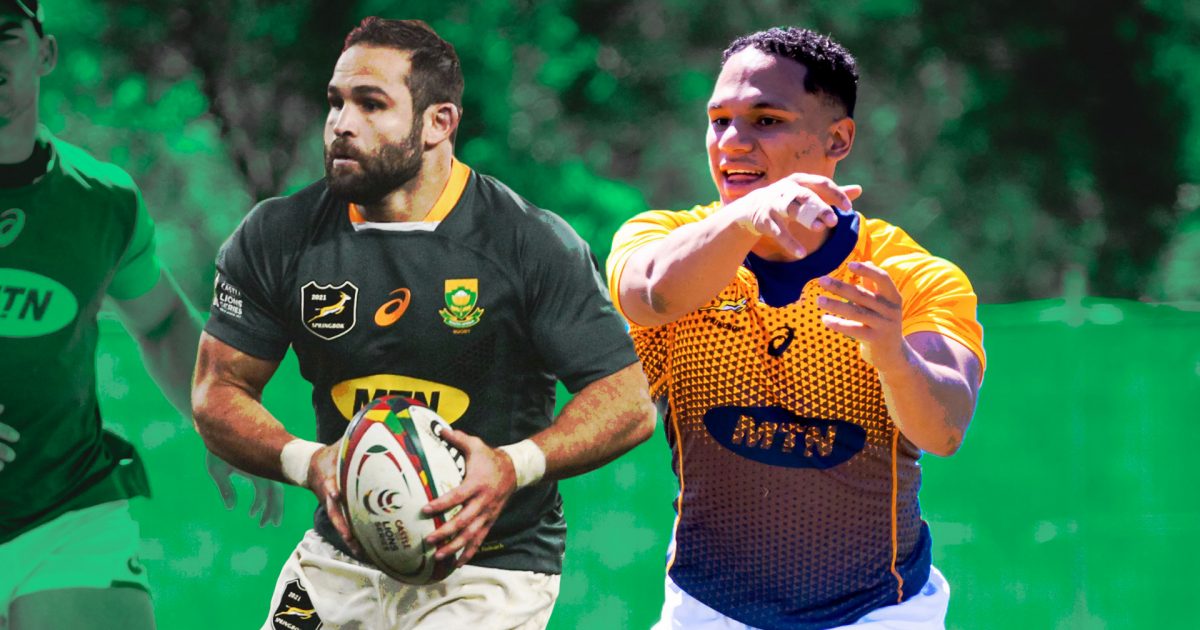Herschel Jantjies selection speaks to 'team first' Bok culture

While the Springbok forward pack is unchanged from their last encounter against the All Blacks in the Rugby Championship, the backline has seen some alterations ahead of the clash against Wales.
Owing to Faf de Klerk’s hip injury and subsequent surgery, South Africa’s hand has been forced at scrumhalf. It must have been a close call between Herschel Jantjies and Cobus Reinach.
In many ways, the selection of Jantjies at number nine creates competitiveness within the squad because I’m sure in Reinach’s heart of hearts he believes he should be starting against Wales at the Principality Stadium on Saturday. Jantjies is also capable of scoring 80 metre tries, but Reinach brings that real X-factor element. He is extremely robust and reminds me of Byron Kelleher of yesteryear, who was so dynamic and strong on the break.
You’re not going to stop those types of players with one-arm tackles. Most forwards would be able to grab a scrumhalf and make a tackle with one arm, but such is his pace and power that you have to put in a proper hit and get a shoulder on Reinach to stop him.
Jantjies has been backed and will be fine in terms of driving the Bok game plan in the wet conditions. While his strengths lie in sniping around the fringes and speeding up the game, the Test against Wales presents a great opportunity for Jantjies to get back to the form he was in when he first broke onto the international scene. He has been in the system for a long time now and knows what is required from a game driver at number nine.
I expect the Stormers scrumhalf to execute the kicking game well as he has proven his worth in that area before. From what I know of him, Reinach is an extremely competitive individual, but he will always put the team first. That is the beauty of the current squad the Springbok coaching staff have put together. The decision to make the three backline changes would have been planned meticulously after the Rugby Championship concluded.
At fullback, Willie le Roux makes way for Damian Willemse. It’s difficult to say what Willemse’s best position is and there has been much conjecture on the subject within South African rugby circles. Everyone thinks of the talented 23-year-old as either a flyhalf or fullback, but I reckon that inside centre could potentially prove to be his most suited position.
He has pretty much got the full package. He is sound defensively, boasts brilliant distribution skills, great feet and is pretty physical.
In the modern game, fullback has become an increasingly important position from a defensive and organisational point of view. The 50/22 law, which is still in its infancy, has introduced an element of change particularly for the fullbacks. In the past, you could have thrown your wingers up flat and hedged your bets, but now you run the risk of losing possession if you leave yourself exposed at the back.
Apart from defence, these days your counter-attacking ability from the back is key and that is where Willemse is going to be particularly strong. The best teams’ ability to counter off poor kicks and mistakes is critical in packaging an all-round fullback. In entrusting Willemse with the role, Jacques Nienaber and Rassie Erasmus clearly have faith in the ex-Paarl Roos Gymnasium playmaker.
However, in any back three mix you need to make sure that you have some calmness when it comes to decision making and your defensive positioning. I feel that is partly why Jesse Kriel was selected on the wing in the absence of S’bu Nkosi, and the former’s presence will aid Willemse against Wales.
In terms of the Springboks’ record in Cardiff, it’s unreal that the reigning world champions last beat the Welsh there in 2013. Wales have always prided themselves on being one of the few nations to take the Boks on upfront. By all accounts they have always been extremely effective at it, especially on home turf. Wayne Pivac’s men will attempt to do pretty much the same, but on this occasion I believe they are a little thin in the forward pack. In the 37th meeting between the two nations, I expect South Africa to have more firepower upfront and, off the back of that, it puts the backs in a better position.
Given the Springboks’ impressive defensive record in recent times, I reckon Pivac is a smart enough coach to realise that to continue attacking against an unbelievable defence might not be the answer. Wales might start with an attacking intent but, if they aren’t making any inroads against the men in green and gold, I would imagine they would revert to a more conservative Warren Gatland-type game plan. The way Pivac previously coached at club level was extremely attacking and ambitious in terms of approach. However, ever since he started with Wales, he has become more conservative.
Following an 11-year career with Saracens, which saw him earn 264 caps, Neil de Kock now works in the rugby division at the Stellenbosch Academy of Sport in South Africa. De Kock, who featured in 10 Test matches for the men in green and gold, provides RugbyPass with expert opinion and insight focusing on the southern hemisphere sides and, in particular, the Springboks.












































Don't let the Stellenbosch boys see the term "Paarl Roos Gymnasium" they will choke on their boerewors. The academy was named after former Bok captain Paul Roos :) and it's in Stellenbosch not Paarl who are mortal enemies on the rugby field. Imagine a Christchurch rugby school being given Auckland status :)